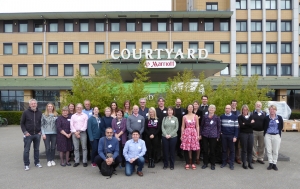Developing guidelines for management of reproductive options for families with maternally inherited mtDNA disease
- Number 243
- Date 22 March 2019
Location: Hoofddorp, the Netherlands
Title: Developing guidelines for management of reproductive options for families with maternally inherited mtDNA disease
Date: 22 – 24 March 2019
Organisers: Dr J. Burgstaller (Austria), Dr. R McFarland (UK), Prof. J. Poulton (UK), Prof. J. Steffann (France)
Translations of this report:
Dutch by Dr S. Sallevelt
French by Prof. J. Steffann
German by Dr B. Arbeithuber
Spanish by Dr J. Bengoa
Participants: Dr. B. Arbeithuber (U.S.A), Dr. J. Bengoa (France), Dr. J. Burgstaller (Austria), Dr. S. Chan (UK), Dr. M. Chiaratti (Brazil), Dr. M. Crouch (UK), Dr. R. Dimond (UK), Dr. T. Enriques (Spain), Dr. G. Gorman (UK), Dr. L. Hyslop (UK), Dr. I. Johnston (UK), Mr. and Mrs. J. Kitto (UK), Mrs. A. Maguire (UK), Dr. R. McFarland (UK), Dr. S. Mitalipov (USA), Mrs. Van Otterloo, (The Netherlands), Prof. J. Poulton (UK), Dr. S. Sallevelt (The Netherlands), Dr. H. Smeets (The Netherlands), Dr. C. Spits (Belgium), Prof. J. St. John (Australia), Prof. J. Steffann (France), Dr. J. Stewart (Germany), Dr. M. Stoneking (Germany), Prof. D. Thorburn (Australia), Ms. E. van der Veer (The Netherlands) and Dr. D. Wells (UK)
Background
Genetic counselling is uniquely difficult in the group of muscle diseases caused by shortage of energy known as “mitochondrial diseases”. Mitochondria are small parts of cells that make energy. They depend on their own unique blueprint, the mitochondrial DNA (mtDNA, the genetic material coding for the energy factories in each cell). MtDNA is inherited exclusively from the mother, and usually all of the mtDNAs in a normal person are identical. In mitochondrial diseases patients may harbour both normal and damaged mtDNA (a situation called heteroplasmy) so babies may inherit both normal and damaged mtDNA from their mothers. Heteroplasmy makes it difficult to predict the chance that a mother with mitochondrial disease will transmit damaged mtDNA to her children. In addition, if the heteroplasmy level is measured in an unborn child it can be difficult to accurately predict how the child might be affected.
There are several different genetic options aiming to prevent the birth of a child affected by severe disease by reducing or preventing transmission of damaged mtDNA.
The simplest option is to offer a healthy egg donated by an unaffected woman.
A second option is pre-implantation genetic diagnosis (PGD). In PGD a woman’s eggs are collected and fertilized with her partner’s sperm in a test tube. A single cell is sampled from the embryos at an early stage in their development, and the healthiest embryo is placed in the woman’s womb. PGD reduces but does not completely eliminate the risk of having an affected child, and cannot be offered to patients in whom all the mtDNA is mutated (homoplasmic).
While PGD is the established prevention procedure in most countries, mitochondrial replacement therapy (MRT) is available as a third option in the UK, and steps have been taken towards making it available in Australia. In the Netherlands MRT is legal but implementation is impractical because the current law prohibits generating embryos for research, which would be needed to set up the technique.
In MRT the nucleus is removed either from an embryo at the very early stages of development, or from an egg from the carrier female and placed into a healthy donor cell at the same stage from which the nucleus has been removed.
We aimed to develop guidelines for the new reproductive options that are becoming available for families with maternally inherited mtDNA disease.
What was achieved?
The scientific, social and ethical background leading to the introduction of MRT into genetic management were discussed. The patients at the meeting felt that the debate had been generally useful. It revealed that in some regions, mitochondrial families had been given little information about the opportunities available. The patient representatives who participated in the workshop are enthusiastic about MRT and feel that the potential benefits out-weigh the uncertainties of these new options. A survey of adult patients in the UK who were consulted about the new technologies showed that patients were broadly supportive of legalization and this was the case even though the debates focused on severe childhood illness which did not match their own experience of late onset disease. They also explained that some of the sound bites used by the UK press were unhelpful.
The need for continuing research was emphasized and participants from this workshop have made plans to collaborate in future projects. A full report of this ENMC workshop, including the scientific advances, will be published in Neuromuscular Disorders.
Outcomes: Counselling protocols and clinical guidelines of who can be offered MRT were discussed.
The following key deliverables were achieved:
- Consensus on referral of patients for MRT
- Counselling guidelines for units carrying out MRT
The clinical guidelines will be reported at international meetings including EUROMIT 2020. A follow up ENMC meeting reporting on implementation of these guidelines in different countries and the short- and long term outcomes of the procedures is planned. This information will be important for countries discussing legalisation of these approaches.
In total, 29 people attended the ENMC workshop including participants from The Netherlands, UK, France, Germany, Spain, Austria, Belgium, Australia, USA and Brazil. The group was multi-disciplinary including patients, clinicians, basic scientists, ethicists, a sociologist, and representatives of industry and patient organizations (including the Lily Foundation, the Dutch Muscular Disease Association, International Mito Patients (IMP) and the LHON group of the Dutch Eye Association).
Glossary, suggestions for explanations can be found at https://www.musculardystrophyuk.org/about-muscle-wasting-conditions/glossary/

A full report is published in Neuromuscular Disorders (PDF).
